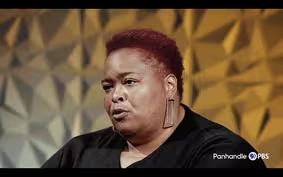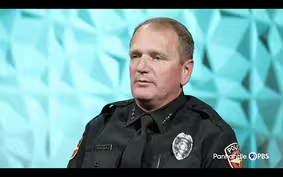Living While Black
What Are Microaggressions?
Clip: 3/18/2021 | 7m 14sVideo has Closed Captions
Dr. Derald Wing Sue discusses microaggressions.
Dr. Derald Wing Sue discusses what microaggressions are, where they come from, and gives some examples of common microaggressions.
Problems playing video? | Closed Captioning Feedback
Problems playing video? | Closed Captioning Feedback
Living While Black is a local public television program presented by Panhandle PBS
Living While Black
What Are Microaggressions?
Clip: 3/18/2021 | 7m 14sVideo has Closed Captions
Dr. Derald Wing Sue discusses what microaggressions are, where they come from, and gives some examples of common microaggressions.
Problems playing video? | Closed Captioning Feedback
How to Watch Living While Black
Living While Black is available to stream on pbs.org and the free PBS App, available on iPhone, Apple TV, Android TV, Android smartphones, Amazon Fire TV, Amazon Fire Tablet, Roku, Samsung Smart TV, and Vizio.
Providing Support for PBS.org
Learn Moreabout PBS online sponsorship- Microaggressions, sort of the every day slights and dignities, insults and put downs that people of color experience in their day-to-day interactions with well-intentioned individuals who are unaware that they are engaging in a demeaning or offensive way towards individuals of color microaggressions are really reflections of implicit bias, the racial bias that is outside the level of conscious awareness so that the person who I s making a microaggression or behaving in such a way is oftentimes unaware that that is occurring in their interactions with others.
Whenever I finish giving a presentation in front of a large audience, it's not unusual for people to come up to me and say, "Professor Sue, you speak excellent English."
The way I respond generally is thank you, I hope so, I was born here.
Now, here is the dilemma of a microaggression.
The perpetrator thinks that they're complimenting you but the hidden or meta communication, that is being received by me is that I'm a perpetual alien in my own country, I am not a true American.
And that's why I respond that way.
- When I am, I overhear or I am told in a conversation, after I deliver a presentation or a speech or a participant in a forum.
And then the word is always, you are so articulate.
You are, he is so articulate or she is so articulate.
That is the phrase that really saddened me more than anything else.
- Is it kind of because of the words for a Black person are in parentheses at the end of that?
- Without a doubt, without a doubt.
- Microaggressions can occur nonverbally.
African-Americans tell me that when they enter an elevator and there is a white passenger, man or a woman, that the moment they enter the elevator, there'll be this tensing up.
- I have gotten on elevators in downtown Amarillo in a suit and tie, and little ol' white ladies clutch their purse about to pass out.
- She pulled over to the corner and grabbed her purse like this.
I think that says it all.
I didn't want anything she had in her purse.
I wasn't gonna grab her, or her purse, but that's what it means by leaving while Black.
- Because in her mind, no matter what I did how I dressed and how I spoke, I am still that Black thug.
- All I know is that, you know, ever since I can remember it's not a shock to me to walk beside a car, you know, just entering a grocery store or a retail store and have someone immediately, you know you hear the click of the locks so the windows roll up as if I'm going to try to reach in or grab the door handle.
- If you ride the subways, if you want to find an empty seat, look for where a Black passenger is seated, it's always nearly empty.
- You sitting in a seat on an airplane and the seat next to you is open, they will look at it and walk pass you.
That still happens to this day.
You know, and they'll sit in the seat behind, next to somebody that's of the same race.
- That's a nonverbal communication that white people are fearful whether they are conscious of it or not.
- So I've never stolen anything, I've been a very quiet shy kid, but the amount of times I've been followed in stores just in Amarillo alone kind of speaks on that.
You're just treated a little differently.
- When I walk in the store they don't ask me if I need help, but they ask the woman that walks in right after me, if she can, you know, if she needs anything.
I could buy anything in the store, but instead of helping me find something to buy you're worried that I'm gonna steal something.
- And I was on a trip with the Tascosa choir, a choir and we're traveling on a trip but it was end of the school year.
I went Banana Republic.
And I don't have a criminal record, never been to jail, never been to juvenile detention, never had any trouble with law enforcement or anything, never been in any kind of trouble of that manner, and at that moment, I got followed around by a Caucasian lady because I guess the way I looked and suspicious that I may steal.
Once again that feeling, I've had other moments, but that feeling at that moment was crushing for me.
- Microaggressions are constant and continual.
They occur to people of color from the moment they are born, until they die, from the moment they awaken in the morning until they go to sleep.
They are cumulative, they're constant reminders of a person's second class status in this society and they are symbolic of past historic injustices, for example, the enslavement of African-Americans, the taking away of land from the indigenous people of this country, the incarceration of 110,000 Japanese Americans, citizens, two-thirds citizens by virtue of birth.
And so these are all things in the mindset, of people of color and a person who doesn't see the overall context of the racialized experiences of people of color really don't understand the experiential reality that people of color deal with constantly.
A microaggression has macro impact, when George Zimmerman killed Trayvon Martin, he was operating from a microaggression that as a Black youngster, that they were up to no good, and he profiled them.
Well, that's a microaggression but what was the outcome?
The death of Trayvon Martin.
(soft music)
Video has Closed Captions
Clip: 3/18/2021 | 5m 57s | An examination of data that shows Black people are more likely to be stopped by police. (5m 57s)
Video has Closed Captions
Clip: 3/18/2021 | 12m 32s | A look at the relationship between the Amarillo Police Department and city residents. (12m 32s)
Providing Support for PBS.org
Learn Moreabout PBS online sponsorship

- News and Public Affairs

Top journalists deliver compelling original analysis of the hour's headlines.












Support for PBS provided by:
Living While Black is a local public television program presented by Panhandle PBS


